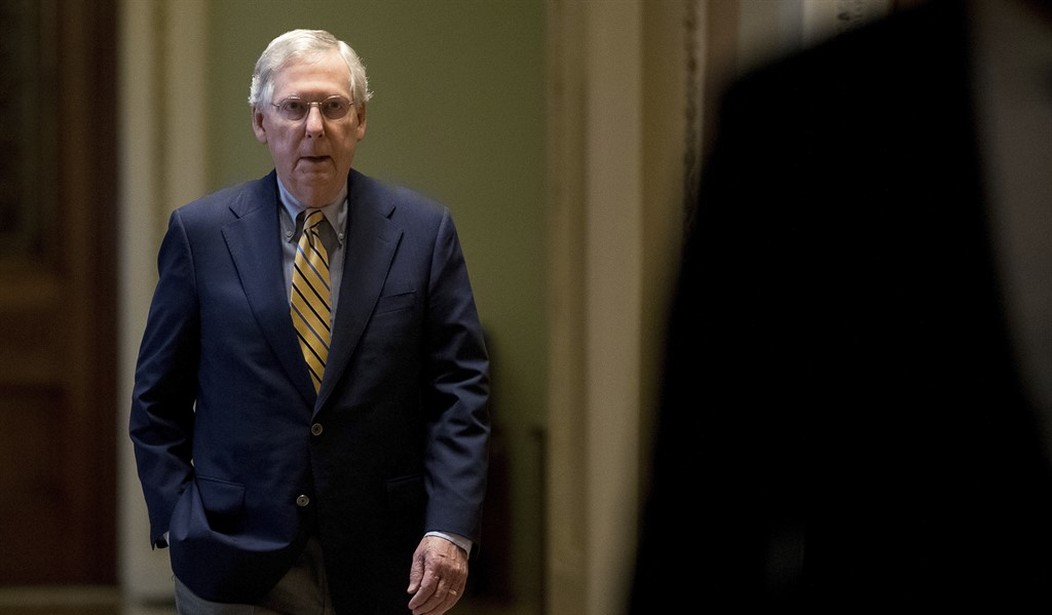The BCRA is dead … but long live the AHCA? After a handful of conservative Senate Republicans rejected the latest version of the attempt to pass a comprehensive repeal and replacement of ObamaCare, Mitch McConnell threw in the towel late last night. Does that mean that ObamaCare is here to stay? Perhaps not quite, but …
My statement on an upcoming vote to repeal #Obamacare pic.twitter.com/RdyDiUJfMD
— Leader McConnell (@LeaderMcConnell) July 18, 2017
The second paragraph lays out the new strategy McConnell will take up, and it’s at least as fraught as the one he just abandoned:
McConnell said the Senate will now take up the House-passed health care bill and amend it with legislation the Senate supported in 2015 to repeal the 2010 health care law “with a two-year delay to provide for a stable transition period to a patient-centered health care system that gives Americans access to quality, affordable care.”
It appears that McConnell wants the AHCA as the default replacement in case Congress can’t do any better in the next two years. Why take up the House bill at all? Senate Republicans rejected it outright as soon as it passed, believing that they could come together on a more inclusive comprehensive plan. Donald Trump wants a straight repeal, but that’s not going to work:
https://twitter.com/realDonaldTrump/status/887134287350439936
Without attaching the House bill to a repeal, however, McConnell would not be able to qualify the bill for reconciliation and would need 60 votes for repeal. The American Health Care Act’s CBO score allows the whole bill to pass with 51 votes rather than the supermajority McConnell will never get. Presumably the flat-out repeal along with a two-year delay with the AHCA as the fallback replacement will allow conservatives and moderates to agree to a game of Kick the Can.
That will create another problem in the House. Some of the 217 Republicans who barely pushed the AHCA over the finish line did so in the expectation that Senate Republicans would create a better approach to repeal and replacement, for which they’d cast a quick vote without any further mess. If the AHCA defaults into law, even with a two-year delay, that leaves House members on the hook for whatever comes next — and some of them didn’t seem terribly anxious for a full repeal in the first place anyway. That raises a real question as to whether Paul Ryan can whip together a majority for McConnell’s new strategy, or whether ObamaCare repeal itself will be declared dead by the August recess.
In fact, it’s still a question whether McConnell can make that work in the Senate. Will moderates trust McConnell to come back to an ObamaCare replacement over the next two years that answers their concerns over Medicaid cuts, and can conservatives trust that McConnell will stand behind those cuts when they take place? The catalyst for last night’s collapse, as I point out in my column for The Week, was McConnell’s attempts to tell everyone what they wanted to hear:
While the governors got a direct presentation of the budgetary impact of the Medicaid expansion reductions, The Washington Post reported that McConnell told members of his caucus last week that the cuts to core Medicaid would likely never be more than theoretical. With the indexing scheduled for the ninth year of the plan, future Congresses would likely either delay or repeal the cuts under political pressure long before they took effect. “He’s trying to sell the pragmatists like Portman, like Capito,” one GOP lobbyist told the Post.
McConnell later denied saying anything of the sort, but it was enough to anger Wisconsin’s Ron Johnson, a conservative who only reluctantly offered support for the BCRA. Johnson pulled his support from the motion to proceed to debate on the bill, claiming that McConnell had engaged in “a pretty serious breach of trust” after confirming the remarks with other senators. With Rand Paul (R-Ky.) and Susan Collins (R-Maine) already publicly opposing the procedural motion, Johnson’s apparent rejection left McConnell at 49 votes — one short of the number necessary to start the floor process.
Actually, make that 47. Shortly after Johnson’s public rebuke, his colleagues Mike Lee (R-Utah) and Jerry Moran (R-Kan.) also announced their opposition to the bill. In his statement, Moran blamed the “closed-door process” that created this version of the BCRA, a thinly veiled swipe at McConnell’s maneuverings. Moran also argued that the bill “fails to repeal the Affordable Care Act or address health care’s rising costs.” Lee’s statement offered similar arguments about the lack of “free space from the most costly ObamaCare regulations,” and saying that it doesn’t have enough impact on premiums for the middle class.
A repeal with a two-year pause in implementation might be the best option — scratch that, the only option — for McConnell. It would give him some time to rebuild his credibility, which this effort has damaged, and for Republicans to get their act together while they deliver on a seven-year promise. The inclusion of the AHCA will force everyone to work together to come up with something better soon, and the flat-out repeal might give room for some Democrats to participate in crafting what comes next. Assuming, of course, that McConnell can get this done.








Join the conversation as a VIP Member